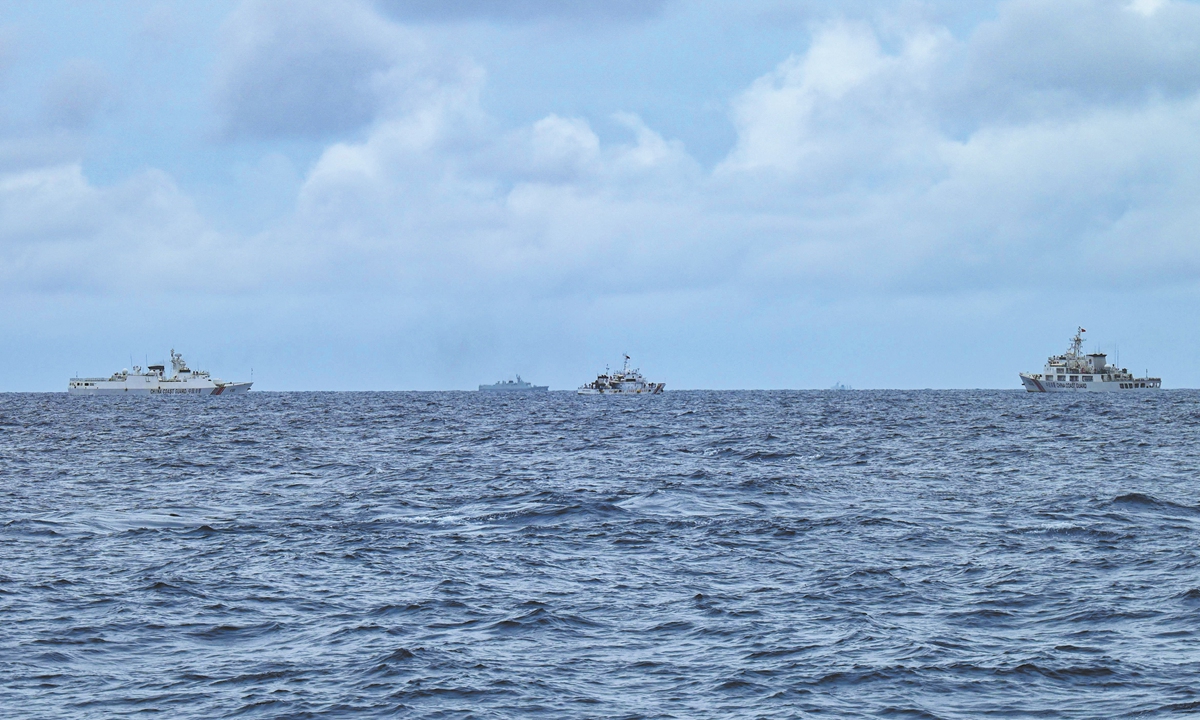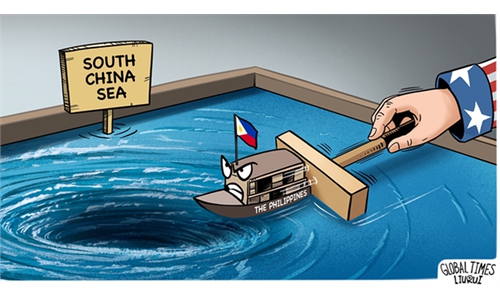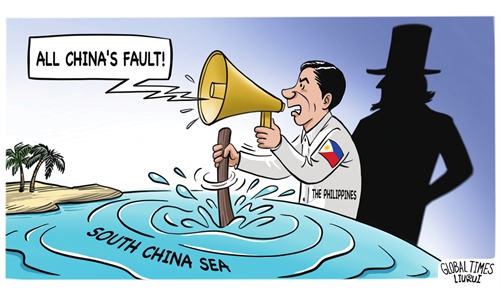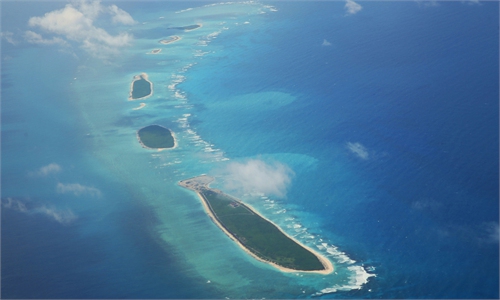US fans flames as Philippines keeps provoking China in South China Sea
Washington’s escort promise ‘to encourage more provocations’

Philippine Coast Guard vessel BRP Cabra intrudes into the adjacent waters of China's Xianbin Jiao and approaches dangerously China Coast Guard ships that are in normal navigation on August 26, 2024. Photo: VCG
Amid escalating tensions in the South China Sea caused by the Philippines' repeated provocations over Chinese islands and reefs, a high-ranking US military officer has announced the US' willingness to hold consultations on escorting Philippine ships in the region, a move Chinese experts said on Wednesday will only fan the flames and encourage Manila to make more infringing provocations.Citing the Mutual Defense Treaty between the US and the Philippines, Admiral Samuel Paparo, head of the US Indo-Pacific Command, said at an international military conference in Manila on Tuesday that the US military is open to consultations about escorting Philippine ships in the South China Sea, the AP reported on Wednesday.
Attending the conference together with Paparo, General Romeo Brawner Jr, chief of Philippine Armed Forces, responded cautiously to the suggestion, reported the AP, which quoted a previous remark by Philippine President Ferdinand Marcos Jr as saying that there has been no situation so far that would warrant activating the treaty.
The military conference in Manila, organized by the US Indo-Pacific Command, comes at a time when the Philippines has been continuously making infringing provocations on Chinese islands and reefs in the South China Sea including Ren'ai Jiao, Huangyan Dao and Xianbin Jiao, each time finding their trespasses restricted by legitimate, professional, restrained but forceful measures from the Chinese side.
Paparo's remarks show that the US is not satisfied to see China's effective management and control measures against the Philippine provocations, nor does it want to see tensions in the South China Sea settle down, because it needs the Philippines to remain at the frontline of its plan to contain China, a Chinese military expert who requested anonymity told the Global Times on Wednesday.
But even the Philippines understands that it would be far too risky for the US military to provide escorts for Philippine trespassing attempts into waters off Chinese islands, the above-quoted expert said.
"If the US really sends warships to escort Philippine provocations, what will happen when they encounter Chinese restrictions? Will this lead to a direct confrontation between China and the US, a situation neither side wants to see? If the US backs down, not only will the US lose influence, the Philippines will also lose its biggest support for its claims in the South China Sea," the expert noted.
The US is just claiming it can provide escorts, which is lip service to encourage more Philippine provocations, while the Philippines does not dare accept the suggestion, the expert said.
CNN on Tuesday hyped China's Xianbin Jiao as "a dangerous new flashpoint," citing multiple Philippine intrusions in attempts to send supplies to a Philippine quasi-grounded coast guard ship. Those attempts were met with restrictive measures by the China Coast Guard.
Xianbin situation
Li Kaisheng, vice president of the Shanghai Institutes for International Studies, told the Global Times on Wednesday that the Philippine ship anchored on Xianbin Jiao is a provocation to China's sovereignty, and China's countermeasures were necessary and legitimate.
Out of political calculations, the Philippine government is putting its coast guard personnel on the quasi-grounded ship at risk. If the Philippines wants to avoid a humanitarian crisis and still cares about the safety of its personnel, it should withdraw its ship from Xianbin Jiao, Li said.
Chen Xiangmiao, director of the World Navy Research Center at the National Institute for South China Sea Studies, told the Global Times on Wednesday that the essence of the Philippines' "supply missions" is a political show with the real goal being expanding "territories" in the South China Sea.
Such provocations have maintained high tensions at sea, and this harms the interests of Philippine fisherfolks too, Chen said.
Also at the military conference in Manila, Philippine Defense Secretary Gilberto Teodoro Jr said that China is "the biggest disrupter" of peace in Southeast Asia and called for stronger international censure over its aggression in the South China Sea, the AP reported.
Manila the true disrupter of peace
In response, Chinese Foreign Ministry spokesperson Lin Jian said at a routine press conference on Tuesday that China urges certain people on the Philippine side to face up to the root cause of the issue, stop going down the wrong path of disrupting regional peace by stirring up troubles and making provocations, and stop the clumsy stunts of calling white black and falsely accusing China.
Ding Duo, deputy director of the Institute of Maritime Law and Policy at the National Institute for South China Sea Studies, said that the Philippines, the one that has provoked in the first place, ignores its provocative behaviors and uses a narrative to hype "China threats" to mislead international audiences and justify its provocative actions.
Experts pointed out that the Philippines is the true disrupter of peace, as it is the Philippines that has intentionally created collision incidents, intentionally quasi-grounded a coast guard vessel at China's Xianbin Jiao for more than four months and caused humanitarian issues with its sailors, and intentionally escalated tensions in the South China Sea that impacted the livelihood of local fishermen, not to mention its bringing of forces outside the region to disrupt regional peace and stability.




